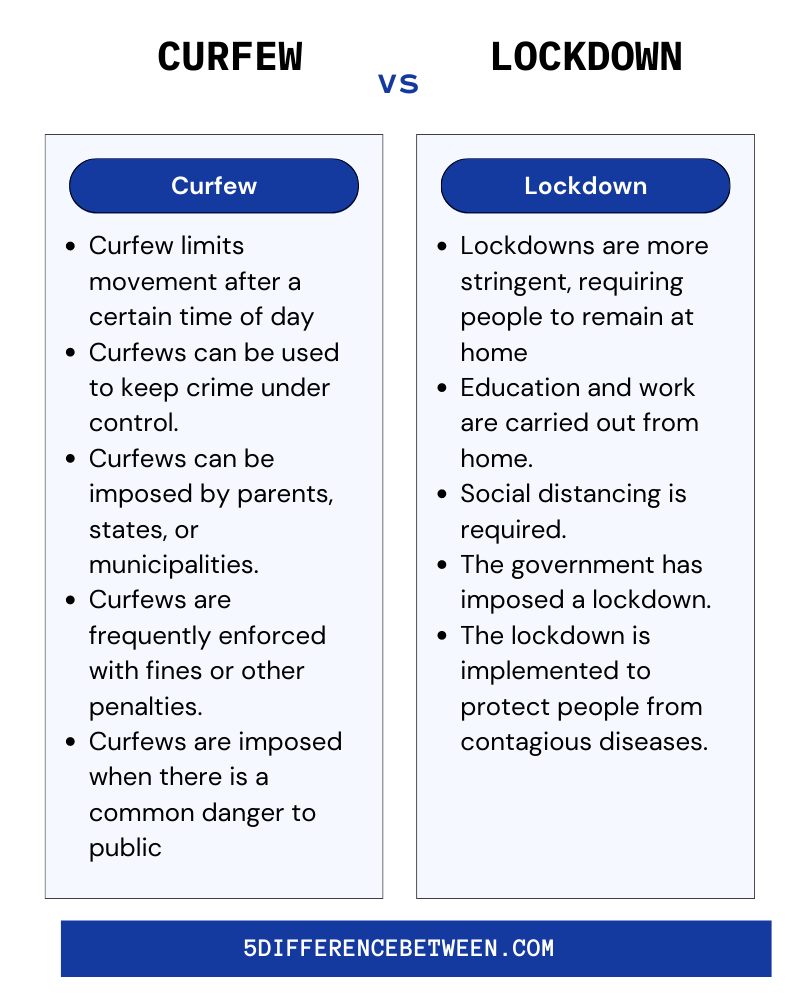Although curfew and lockdown are frequently used interchangeably, there are some significant difference between curfew and lockdown. Both measures are designed to limit people’s movement in specific areas, but their goals and scope of implementation differ. In this article, we’ll look at the five key differences between curfew and lockdown.
To understand the difference better it’s essential to understand what is curfew and lockdown.
What is a Curfew?
A curfew is a law or regulation that requires people, usually minors, to stay indoors or in a specific location at certain times of the night. Curfews are commonly used to reduce crime, prevent juvenile delinquency, and provide young people with guidance and structure.
State and local laws frequently govern curfews. Minors are generally not permitted to be out in public after a certain hour unless they are accompanied by an adult. Some places have a curfew that applies to all minors, while others may have different curfews for different age groups. For those under the age of 16, a city, for example, when does curfew start and end so it generally starts at 10 p.m., and 11 p.m. for those 16 and older.
Most curfews exempt minors if they are accompanied by an adult or are engaged in activities such as school, church, or work. Opponents of curfews argue that they violate civil liberties and unfairly target specific groups of people. Curfew enforcement varies by jurisdiction. In some jurisdictions, minors who are out past curfew may be stopped by police and taken home or to a detention center. Other jurisdictions empower police officers to issue citations or warnings. In most cases, curfew violations are classified as misdemeanors.
Curfews are generally intended to keep young people safe and out of trouble. They can also provide structure and guidance to young people at risk of engaging in delinquent behavior. Opponents of curfews contend that they violate civil liberties and unfairly target specific groups of people. When deciding whether or not to impose curfews in their jurisdictions, local governments must consider this debate.
What is a Lockdown?
When people are advised to stay at home and avoid contact with others for an extended period of time, this is referred to as a lockdown. Lockdowns can be imposed by governments in response to a variety of threats, including natural disasters, civil unrest, terrorist attacks, and public health emergencies like the COVID-19 pandemic. During a lockdown, people are asked to stay at home, limit their contact with others, and avoid going out in public. Depending on the severity of the situation, this could include a complete stay-at-home order, the closure of schools and non-essential businesses, as well as travel and large gathering restrictions. Grocery stores, pharmacies, and hospitals may remain open, but customers are usually asked to maintain social distance while visiting these establishments.
A lockdown is used to keep an infectious disease, such as COVID-19, from spreading. Limiting human contact and travel reduces the likelihood of the virus spreading from person to person. Lockdowns can have serious physical and psychological consequences for people’s lives. People may feel isolated, anxious, and depressed as a result of their lack of contact with others and restrictions on travel and activities. Individuals suffering from mental illnesses may be especially vulnerable.
Also Read > Difference Between Race and Ethnicity
Keeping in touch with family and friends, even if only via email or phone, is critical during a lockdown. Lockdowns can also have significant economic consequences. Non-essential businesses may be forced to close, resulting in job losses and lower economic activity. This has the potential to result in additional job losses and economic hardship. Despite their inconvenient nature, lockdowns are frequently an effective method of limiting the spread of infectious diseases.
Lockdown measures can aid in the reduction of cases and hospitalizations while also protecting vulnerable people from infection. It is critical to follow the government’s guidelines during a lockdown and to remember that, while it may be difficult, the measures are in place to protect the population’s health.
Curfew Vs Lockdown

Curfews and lockdowns are both government-enforced measures designed to limit the spread of infectious diseases. The main difference between curfew and lockdown is that a, whereas a lockdown completely prohibits movement and other activities. Curfews are more limited in scope and allow some activities, such as essential services, to continue. Both measures can be effective in limiting disease spread, but the severity of the restriction varies depending on the situation.







One Comment to “5 Difference Between Curfew and Lockdown”